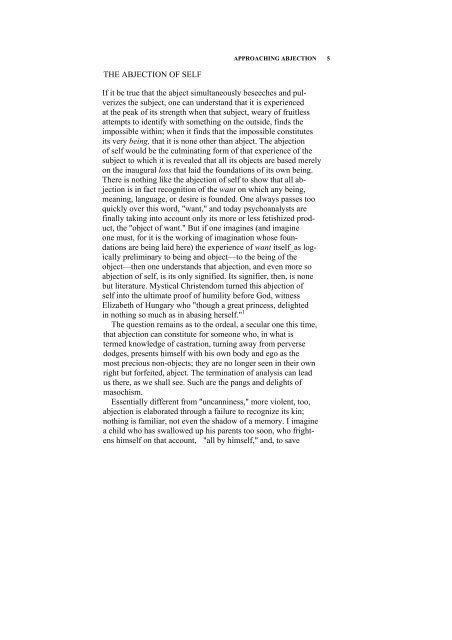Powers of Horror; An Essay on Abjection
Powers of Horror; An Essay on Abjection
Powers of Horror; An Essay on Abjection
You also want an ePaper? Increase the reach of your titles
YUMPU automatically turns print PDFs into web optimized ePapers that Google loves.
THE ABJECTION OF SELF<br />
APPROACHING ABJECTION 5<br />
If it be true that the abject simultaneously beseeches and pul-<br />
verizes the subject, <strong>on</strong>e can understand that it is experienced<br />
at the peak <str<strong>on</strong>g>of</str<strong>on</strong>g> its strength when that subject, weary <str<strong>on</strong>g>of</str<strong>on</strong>g> fruitless<br />
attempts to identify with something <strong>on</strong> the outside, finds the<br />
impossible within; when it finds that the impossible c<strong>on</strong>stitutes<br />
its very being, that it is n<strong>on</strong>e other than abject. The abjecti<strong>on</strong><br />
<str<strong>on</strong>g>of</str<strong>on</strong>g> self would be the culminating form <str<strong>on</strong>g>of</str<strong>on</strong>g> that experience <str<strong>on</strong>g>of</str<strong>on</strong>g> the<br />
subject to which it is revealed that all its objects are based merely<br />
<strong>on</strong> the inaugural loss that laid the foundati<strong>on</strong>s <str<strong>on</strong>g>of</str<strong>on</strong>g> its own being.<br />
There is nothing like the abjecti<strong>on</strong> <str<strong>on</strong>g>of</str<strong>on</strong>g> self to show that all ab-<br />
jecti<strong>on</strong> is in fact recogniti<strong>on</strong> <str<strong>on</strong>g>of</str<strong>on</strong>g> the want <strong>on</strong> which any being,<br />
meaning, language, or desire is founded. One always passes too<br />
quickly over this word, "want," and today psychoanalysts are<br />
finally taking into account <strong>on</strong>ly its more or less fetishized prod-<br />
uct, the "object <str<strong>on</strong>g>of</str<strong>on</strong>g> want." But if <strong>on</strong>e imagines (and imagine<br />
<strong>on</strong>e must, for it is the working <str<strong>on</strong>g>of</str<strong>on</strong>g> imaginati<strong>on</strong> whose foun-<br />
dati<strong>on</strong>s are being laid here) the experience <str<strong>on</strong>g>of</str<strong>on</strong>g> want itself_as log-<br />
ically preliminary to being and object—to the being <str<strong>on</strong>g>of</str<strong>on</strong>g> the<br />
object—then <strong>on</strong>e understands that abjecti<strong>on</strong>, and even more so<br />
abjecti<strong>on</strong> <str<strong>on</strong>g>of</str<strong>on</strong>g> self, is its <strong>on</strong>ly signified. Its signifier, then, is n<strong>on</strong>e<br />
but literature. Mystical Christendom turned this abjecti<strong>on</strong> <str<strong>on</strong>g>of</str<strong>on</strong>g><br />
self into the ultimate pro<str<strong>on</strong>g>of</str<strong>on</strong>g> <str<strong>on</strong>g>of</str<strong>on</strong>g> humility before God, witness<br />
Elizabeth <str<strong>on</strong>g>of</str<strong>on</strong>g> Hungary who "though a great princess, delighted<br />
in nothing so much as in abasing herself." 1<br />
The questi<strong>on</strong> remains as to the ordeal, a secular <strong>on</strong>e this time,<br />
that abjecti<strong>on</strong> can c<strong>on</strong>stitute for some<strong>on</strong>e who, in what is<br />
termed knowledge <str<strong>on</strong>g>of</str<strong>on</strong>g> castrati<strong>on</strong>, turning away from perverse<br />
dodges, presents himself with his own body and ego as the<br />
most precious n<strong>on</strong>-objects; they are no l<strong>on</strong>ger seen in their own<br />
right but forfeited, abject. The terminati<strong>on</strong> <str<strong>on</strong>g>of</str<strong>on</strong>g> analysis can lead<br />
us there, as we shall see. Such are the pangs and delights <str<strong>on</strong>g>of</str<strong>on</strong>g><br />
masochism.<br />
Essentially different from "uncanniness," more violent, too,<br />
abjecti<strong>on</strong> is elaborated through a failure to recognize its kin;<br />
nothing is familiar, not even the shadow <str<strong>on</strong>g>of</str<strong>on</strong>g> a memory. I imagine<br />
a child who has swallowed up his parents too so<strong>on</strong>, who fright-<br />
ens himself <strong>on</strong> that account, "all by himself," and, to save

















